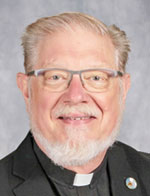That All May Be One / Fr. Rick Ginther
Wanted: Your questions about ecumenical and interreligious topics
 From time to time—and mostly in face-to-face encounters—I receive thanks for these monthly columns.
From time to time—and mostly in face-to-face encounters—I receive thanks for these monthly columns.
Often, these thanks are accompanied by: “I look forward each month to your column.” Or “I find the content inviting me to explore another religion.” Or “many of the columns remind me how important it is to find a sense of oneness in our divided world.”
These encounters are gratifying and humbling.
I thank these folks. Some I ask to pray for the journey toward unity. Others
I ask to pray for people of all faiths who are seeking sincerely the presence of
God in their lives.
Sept. 19, 2014, was the publication date of my first column. Since then, 115 have been penned. Occasionally, guest writers such as Deacon John Cord, Anders Kilmark and Dr. Alan Bercovitz have contributed.
Choosing a topic each month can be challenging. The Christian liturgical calendar provides ideas. Current events—local, national or worldwide—are often a driving force. An important anniversary in the life of the Church begs to be noted. Or an exotic aspect of another religion’s festival may lead to connections to one of our own.
Once decided upon, the topic may roll across the keyboard toward its 575-word limit. Or it may be a slow bleeding of ideas searching for coherence. More often than not, research is required.
Then, there is attention to the details that connect with our lives (the familiar) so that the less familiar will rise from the page with more receivable meaning.
The hardest part of writing is simplicity of style and clarity. Simple, short sentences are preferred. A unique turn of phrase may be tolerated, but only if it contributes to the readers’ understanding and enjoyment.
Back to the 575-word limit. Some complex topics require more words. (Thank you, Criterion editors!) More than not, shortening of paragraphs becomes necessary. Admission that the column is an introduction of an idea must be repeated by the editor bird on my shoulder. A final invitation for the reader to explore further may be the best solution to soften the complexity.
Behind all of this parsing of words and smithing of thoughts is this—speaking to truth:
-
The truth of similarities and common origins. The Golden Rule comes to mind.
-
The truth of cultural, historical and geographic context. Eastern grasp of the human condition vs. Western grasp is an example.
-
The truth of seeking the divine, that which is greater than the self or the collective, as a catechism imperative.
-
The truth of religion, its organized patterns of behaviors, values, ideals, beliefs and virtues that bring about a direction for living life.
-
The truth that truth itself is not the sole possession of one but a shared journey.
-
The truth of the uniqueness of the Christian religion, that only in Christ has God approached humankind directly and brought about the gift of universal salvation.
-
The truth that other religions share some part of the truth. From there, we begin our search in life together.
Nearly 11 years in, it’s time for me to ask you, the reader: Is there an ecumenical or interreligious topic that is of interest to you? If so, send me an e-mail at rginther@archindy.org. If a column springs forth, wonderful. If some direction to sources you can explore is better, I will try to provide.
And thank you for your continued reading!
(Father Rick Ginther is director of the archdiocesan Office of Ecumenism and Interreligious Affairs. He is also the pastor of Our Lady of Lourdes Parish in Indianapolis.) †
 From time to time—and mostly in face-to-face encounters—I receive thanks for these monthly columns.
From time to time—and mostly in face-to-face encounters—I receive thanks for these monthly columns.